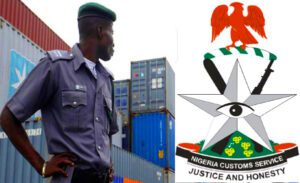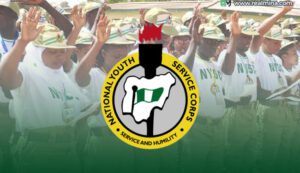
Labour strike: FG commits to minimum wage over N60,000
…Tripartite Committee to meet daily to determine new wage
…Nationwide blackout as Labour shuts down National grid
…Maritime workers strike paralyses seaport operations
…Ex-NLC President suggests N100,000 minimum wage
By Our Correspondents
In response to the Organised Labour strike on Monday which had full compliance in Lagos, Ogun, Osun, among others, the Federal Government has committed to a national minimum wage above N60,000.
In the resolutions reached at the emergency meeting between the FG and Organised Labour, the Secretary to the Government of the Federation, George Akume, disclosed “the President is committed to a National Minimum Wage that is higher than N60,000.”
He added that “the Tripartite Committee is to meet everyday for the next one week with a view to arriving at an agreeable National Minimum Wage.”
The resolutions read, “The President, Commander-in-Chief of the Armed Forces, Federal Republic of Nigeria is committed to a National Minimum Wage that is higher than N60,000. “Arising from the above, the Tripartite Committee is to meet every day for the next one week with a view to arriving at an agreeable National Minimum Wage.
“Labour in deference to the high esteem of the President, Commander-in-Chief of the Armed Forces, Federal Republic of Nigeria’s commitment in (ii) above undertakes to convene a meeting of its organs immediately to consider this commitment; and
“No worker would be victimised as a result of the industrial action.”
Recall, that some states in Nigeria came to a standstill as workers in Lagos, Ogun, Osun, and others embarked on a total industrial strike action, demanding a new minimum wage.
The Tripartite Committee is set to meet today to discuss the contentious issue, businesses, banks, and markets remain shut, causing economic activities to grind to a halt.
The Nigeria Labour Congress (NLC) on Monday barricaded all entrances into Lagos State Secretariat, Alausa, Ikeja, stopping workers from entering into the premises.
The NLC and Trade Union Congress (TUC) had directed Nigerian workers to begin an indefinite strike following the inconclusiveness of discussions on a new minimum wage.
This move is in compliance with the indefinite strike directive issued by the NLC and Trade Union Congress (TUC) following the Federal Government’s failure to meet the May 31 deadline for approving and implementing a new minimum wage.
Despite a last-minute intervention by the National Assembly on Sunday night, the strike went ahead as planned, with labour union leaders locking workers outside the gates. A police presence was observed at the scene.
The strike significantly impacted business activities in and around the secretariat, with some shops remaining closed and others operating on a skeletal basis.
Meanwhile, the Tripartite Committee on National Minimum Wage (TCNMW) has announced that it will hold its 8th meeting today, June 4, to continue negotiations on the minimum wage.
The committee’s secretary, Mr. Ekpo Nta, confirmed this in a statement released in Abuja on Monday.
The Federal Government has proposed a new minimum wage of N60,000, while labour is demanding N495,000.
“I respectfully invite you to attend the 8th meeting of the Tripartite Committee on National Minimum Wage,” Nta said. “The meeting is scheduled for Tuesday, June 4, 2024, at Nicon Luxury Hotel, Area 11, Abuja at 10:00 a.m. prompt.”
Nta mentioned that the minutes of the 7th meeting, the draft agenda for the 8th meeting, and the Zoom link for virtual attendance will be forwarded in due course. He urged the chairman of the committee, members, and observers to take note.
Meanwhile, the strike had brought Ogun State to a standstill, with banks, schools, and hospitals shut down.
In Abeokuta, the state capital, banks around the Oke-Ilewo area remained closed, while schools in the vicinity sent pupils back home.
At the State Hospital, Ijaye, nurses withdrew their services, leaving doctors to provide skeletal services.
The strike has disrupted economic and social activities in the state, with many residents expressing frustration and concern about the situation.
The state government has yet to make an official statement on the strike.
…Nationwide blackout as Labour shuts down National grid
The Transmission Company of Nigeria (TCN) has announced that its workers’ union shut down the national grid, resulting in a nationwide blackout.
According to TCN’s General Manager, Public Affairs, Ndidi Mbah, the shutdown occurred at 2:19 a.m. on Monday.
The union’s action follows a reported incident at the Benin Transmission Operator, where operators were allegedly driven away from the control room, with some workers beaten and wounded.
The Benin Area Control Center’s operations were subsequently brought to a halt, plunging the country into darkness. The TCN is working to resolve the situation and restore power supply.
…Osun joins nationwide strike, as ex-NLC President suggests N100,000 minimum wage
Also, commercial activities in Osun State were grounded on Monday as workers joined the nationwide strike called by the Nigeria Labour Congress (NLC) and Trade Union Congress (TUC).
Apart from the banks, public schools, and government offices were closed, while drivers of intercity buses initially threatened to join the strike but later retreated.
It would be recalled that the labour unions under the umbrella of the Nigeria Labour Congress and the Trade Union Congress are demanding a new minimum wage of N494,000 in line with the current economic realities of the nation.
Speaking during an interview with journalists in Osogbo, the former President of the Nigeria Labour Congress, NLC, From 1978 to 1984, Comrade Hassan Sunmonu emphasised the need for Government at all levels to reduce the cost of governance by 50 percent to improve the Nation’s Economy and to make life bearable for the Masses.
Comrade Sunmonu said the Government is not sincere with the plight of the Nigerian Workers and Nigerians considering the various policies made in the past, therefore, the Political Office Holders should also make sacrifices for the Nation by reducing their allowances.
He pointed out that if the Federal Government refuses to review the price of Petroleum Products downward and stop over taxing the common man, the Labour should not collect less than N100,000 as the new minimum wage for Civil Servants.
…Kwara State government offices, schools, courts, and other institutions shut down
Also, in Kwara State government offices, schools, courts, and other institutions were shut down.
Public schools and offices in Ilorin were locked up, with students turned back, except for final-year students sitting for WAEC exams.
The industrial action has grounded all activities in the state, with workers demanding a new minimum wage.
The Presidency has accused the Nigerian Labour Congress (NLC) of playing politics with its ongoing nationwide strike, harming the very people it claims to be fighting for.
Special Adviser on Information and Strategy to President Bola Tinubu, Bayo Onanuga, made the accusation on Monday, stating that the strike has denied sick Nigerians access to medical care at government hospitals.
Onanuga expressed sadness over Labour’s extreme action, which he believes is harmful to the people they claim to represent. The accusation comes as the strike enters its second day, with workers demanding a new minimum wage.
Posting on X (formerly Twitter), Onanuga wrote: “It’s saddening that Labour could go to this extreme. But it is not surprising to the perceptive minds. Labour is harming the Nigerian people they claim to be fighting for. Today, many sick Nigerians cannot access medical care at government hospitals.
“Not even those with critical medical conditions. It appears labour is playing politics by other means. Many of the affiliates of the two central unions, NLC and TUC are members and supporters of the Labour Party.
“They logically bear ill will and grudges against the Tinubu administration. Otherwise, the issue they claim to be fighting for cannot be resolved by blackmail or sabotage, they cannot even be resolved by the Federal Government unilaterally, the Labour leaders will still have to return to the negotiating table.”
…FG loses billions as Maritime workers strike paralyses seaport operations
The Federal Government lost over billions of naira through the ports industry alone as the Maritime workers, Nigeria Labour Congress (NLC) induced a strike that paralyzed economic and commercial activities at the ports industry.
The ports were shut sequel to directives by the NLC and the Trade Union Congress (TUC) to the Maritime Workers Union of Nigeria (MWUN), (a key affiliate of the NLC), to join the indefinite strike action, which commenced yesterday, following failure in negotiations for new minimum wage.
Port workers, Customs brokers, haulage operators, freight forwarders and truck drivers were locked out of the ports, and the roads empty.
Both the gates of Apapa and the Tin Can Island Ports were sealed.
The strike, which began indefinitely, is in protest of the federal government’s failure to conclude on the national minimum wage and refusal to reverse the new electricity tariff.
Port users were also prevented from accessing their offices, thereby causing disruptions to the supply chain.
The President, NPA Branch of MWUN, Comrade Ifeanyi Mazeli confirmed to our correspondent that the ports were grounded in compliance with the NLC directive and would remain so until the strike is called off.
“The ports are currently shutdown and this will continue until the strike lasts,” he said.
Also speaking, President of Dockworkers branch of MWUN, Comrade Ibrahim Ohize said vessels are not allowed to berth and no trucks are permitted to go in or leave the port.
“The strike is ongoing and it is indefinite, affecting all ports in the country including Warri, Port Harcourt and Onne,” he said.
Ohize stressed that the Union is complying with the NLC’s directive and they are awaiting instructions from the leadership of the various unions who are currently in Abuja.
“We are standing solidly behind the NLC and we will not bayanack down until our demands are met,” he said.




